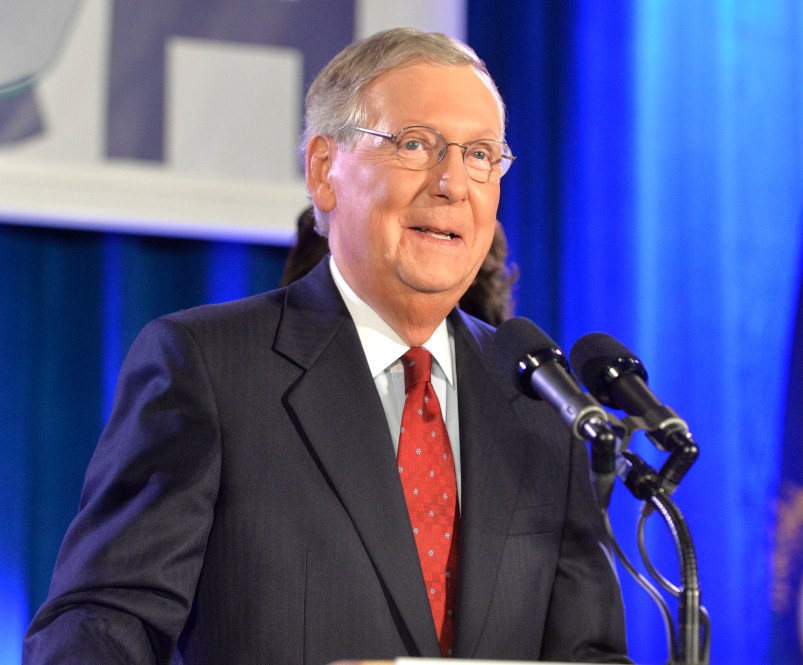By the time Sen. Mitch McConnell (R-KY) moves in to the majority leader’s suite just off the Senate floor, he’ll likely be leading a caucus of 54 Republican senators.
That means he’ll need six Democrats to break filibusters and achieve the magic 60-vote threshold required to pass controversial legislation through the Senate, such as hacking away at Obamacare or approving the Keystone pipeline.
There are six Democrats who are most likely to, in the interest of bipartisanship, join Republicans on some key issues and make life miserable for Democratic leaders and President Barack Obama. Think of them as the Ben Nelsons of the next Congress.
McConnell’s incentives will be different than those of Senate Majority Leader Harry Reid (D-NV), because his majority will largely remain the party of opposition to Obama. Unlike Reid, who has had an interest in functional government, McConnell could conceivably decide that the GOP is better off politically if the partisan stalemate continues ahead of the 2016 election, because presidents take the lion’s share of the blame for inaction.
“He benefits from that actually because it helps to create the gridlock he can run against,” said Jim Manley, a former top spokesman for Reid. “And to date, with few exceptions, [McConnell has] not shown much willingness to compromise with the president.”
Of course, McConnell may sometimes face defections from within his own caucus, which would complicate his task of legislating.
“I think what we’ve seen with McConnell is in the minority is that he’s had a very substantial capacity is keeping his troops united,” said Norm Ornstein, a congressional scholar with the American Enterprise Institute. “I think that erodes considerably under these circumstances [when he’s in the majority].”
If he does manage to keep his caucus united, here are McConnell’s six top Democratic prospects for reaching 60 votes.
Sen. Claire McCaskill of Missouri

It took Todd Akin of “legitimate rape” notoriety to save McCaskill from electoral doom in 2012, and this second-term Missourian recognizes that she can’t vote in lock-step with her party if she wants to stay in the good graces of her conservative-leaning state. Look for her to side with Republicans from time to time to appease her right flank, on issues such as the Keystone pipeline.
Sen. Joe Manchin of West Virginia

This conservative Democrat has always looked for ways to make himself attractive to West Virginians, from literally shooting the cap-and-trade bill in a campaign ad to voting against Reid on filibuster reform. With the ranks of conservative Democrats diminished in the wake of the 2014 blowout, Manchin will look for opportunities to tout his bipartisan bona fides.
Sen. Heidi Heitkamp of North Dakota

Heitkamp won her first Senate election in 2012 by a razor-thin 1 percent margin in deep-red North Dakota. Not shy about breaking with her party, she was one of just four Democrats who voted to block the popular gun background checks legislation in 2013 — the other three have retired or lost reelection. Expect her to hunt for issues where she can align herself with the new Republican majority.
Sen. Joe Donnelly of Indiana

Donnelly largely owes his seat to Indiana Republicans who threw out an untouchable incumbent in 2012 in favor of a candidate who imploded over a rape gaffe in the general election. One of the more conservative Democrats, he’ll likely be willing to partner with McConnell’s Republicans in some cases, such as reversing the 30-hour work week definition under Obamacare.
Sen. Angus King of Maine

King, a progressive-leaning independent who says he’ll continue to caucus with Democrats, has often looked for ways to polish his nonpartisan credentials. In two years as a senator, King has tried to play deal-maker and split with Democrats on issues like gun control and student loans.
Sen. Jon Tester of Montana

Tester survived reelection in the Democrat-friendly year of 2012, but his party got wiped out this year in the race for Montana’s other Senate seat. Tester has been willing to buck Democratic leaders at times, most notably when he helped kill the DREAM Act by filibuster in 2010.
(All photos via The Associated Press)







Keeping your troops in line to NOT take action is easier than convincing them to unite to DO something. McConnell will have to find items that the GOP’s different factions agree on.
Sigh.
Another deeply superficial non-story by Sahil.
Why does this man still have a job?
Tester is angling for the DSCC chairman spot; I suspect he may take a more liberal line on issues in this congress.
I don’t understand. The Republicans aren’t willing to put up with the sort of shenanigans in which they have engaged during the past six years. If the Dems start using the filibuster as a way to thwart The Will of the People, McConnell will simply do away with it.
Sahil’s apparent motto: “Any story to make things sound bad for Obama, especially ones with lots of speculation!”